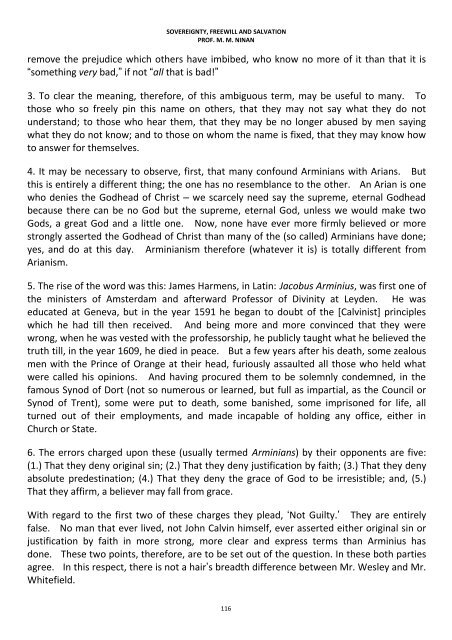Calvinism and Arminianism
Create successful ePaper yourself
Turn your PDF publications into a flip-book with our unique Google optimized e-Paper software.
SOVEREIGNTY, FREEWILL AND SALVATION<br />
PROF. M. M. NINAN<br />
remove the prejudice which others have imbibed, who know no more of it than that it is<br />
“something very bad,” if not “all that is bad!”<br />
3. To clear the meaning, therefore, of this ambiguous term, may be useful to many. To<br />
those who so freely pin this name on others, that they may not say what they do not<br />
underst<strong>and</strong>; to those who hear them, that they may be no longer abused by men saying<br />
what they do not know; <strong>and</strong> to those on whom the name is fixed, that they may know how<br />
to answer for themselves.<br />
4. It may be necessary to observe, first, that many confound Arminians with Arians. But<br />
this is entirely a different thing; the one has no resemblance to the other. An Arian is one<br />
who denies the Godhead of Christ – we scarcely need say the supreme, eternal Godhead<br />
because there can be no God but the supreme, eternal God, unless we would make two<br />
Gods, a great God <strong>and</strong> a little one. Now, none have ever more firmly believed or more<br />
strongly asserted the Godhead of Christ than many of the (so called) Arminians have done;<br />
yes, <strong>and</strong> do at this day. <strong>Arminianism</strong> therefore (whatever it is) is totally different from<br />
Arianism.<br />
5. The rise of the word was this: James Harmens, in Latin: Jacobus Arminius, was first one of<br />
the ministers of Amsterdam <strong>and</strong> afterward Professor of Divinity at Leyden. He was<br />
educated at Geneva, but in the year 1591 he began to doubt of the [Calvinist] principles<br />
which he had till then received. And being more <strong>and</strong> more convinced that they were<br />
wrong, when he was vested with the professorship, he publicly taught what he believed the<br />
truth till, in the year 1609, he died in peace. But a few years after his death, some zealous<br />
men with the Prince of Orange at their head, furiously assaulted all those who held what<br />
were called his opinions. And having procured them to be solemnly condemned, in the<br />
famous Synod of Dort (not so numerous or learned, but full as impartial, as the Council or<br />
Synod of Trent), some were put to death, some banished, some imprisoned for life, all<br />
turned out of their employments, <strong>and</strong> made incapable of holding any office, either in<br />
Church or State.<br />
6. The errors charged upon these (usually termed Arminians) by their opponents are five:<br />
(1.) That they deny original sin; (2.) That they deny justification by faith; (3.) That they deny<br />
absolute predestination; (4.) That they deny the grace of God to be irresistible; <strong>and</strong>, (5.)<br />
That they affirm, a believer may fall from grace.<br />
With regard to the first two of these charges they plead, ‘Not Guilty.’ They are entirely<br />
false. No man that ever lived, not John Calvin himself, ever asserted either original sin or<br />
justification by faith in more strong, more clear <strong>and</strong> express terms than Arminius has<br />
done. These two points, therefore, are to be set out of the question. In these both parties<br />
agree. In this respect, there is not a hair’s breadth difference between Mr. Wesley <strong>and</strong> Mr.<br />
Whitefield.<br />
116

















